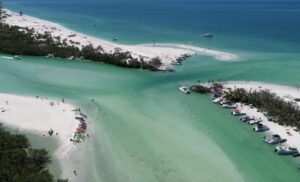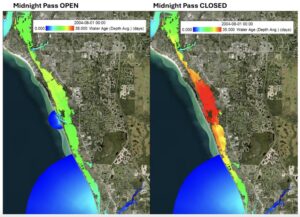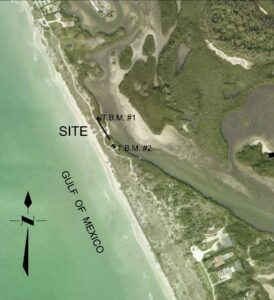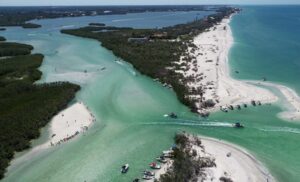Environmentalist cautions about risks and cost of keeping the inlet open.
By Johannes Werner
Original Air Date: September 10, 2025
Host: The words “Mother Nature” came up at least a dozen times at a Sarasota County Commission meeting this week about Midnight Pass. Everybody is in awe of Mom right now — the assumption is that the breach blown open by last year’s hurricanes is good, because it makes the water flow, and that’s good for water quality in Little Sarasota Bay. Commissioners, island activists, boaters, and a consultant are now focused on making sure the new inlet will stay open. But an environmentalist is raining on the parade. His word of caution: While we’re bowing in awe to Mother Nature, we keep messing with Mom. The county may end up having to dredge to keep the water flowing. And that is expensive and risky.
 Glenn Compton: The only thing we really know at this point is that, if Sarasota County does move to intervene, it will be a very expensive process to do it with no guarantee of success—that maybe the paths will close right back up if the county intervenes, and also it is something that could open the county up to litigation a little bit down the road. Siesta Key and Casey Key are barrier islands, and barrier islands are subject to change. We certainly found that out last year with hurricane season and the storm surge that was produced. Midnight Pass doesn’t have a whole lot of room to move.
Glenn Compton: The only thing we really know at this point is that, if Sarasota County does move to intervene, it will be a very expensive process to do it with no guarantee of success—that maybe the paths will close right back up if the county intervenes, and also it is something that could open the county up to litigation a little bit down the road. Siesta Key and Casey Key are barrier islands, and barrier islands are subject to change. We certainly found that out last year with hurricane season and the storm surge that was produced. Midnight Pass doesn’t have a whole lot of room to move.
Johannes Werner: That’s Glenn Compton, chair of ManaSota-88, probably the area’s longest-standing environmental grassroots group.

Diagram showing the increase in water quality in Little Sarasota Bay since hurricanes blew Midnight Pass open.
The item on the county commission’s agenda Tuesday was called “Keep it Open!”. With an exclamation point. And the commissioners reflected that sense of urgency. The county already pays hundreds of thousands of dollars to a consultant to keep close track of the water flow at Midnight Pass. The news he brought them Tuesday was good. After 10 months since the storm surge created it, nature is increasing the flow.
Consultant: We have a larger inlet and we have more flow, which is a good sign that trends towards a more stable inlet. If it gets bigger and you get more flow, that means there’s more forcing. There’s more ability for it to stay open. It doesn’t guarantee it, but it is a good trend.
JW: But that could reverse. As Commission Chair Joe Neunder put it—with an excuse for the pun—“the situation is fluid.” Right now, the inlet is in the fast-evolving toddler stage of its first five years. Then, it will keep changing over decades. Slower, but still changing.
 It takes years to get a full-blown dredging permit. So how will the county deal with this? For one, it will have to continue to pay a consultant to closely monitor Midnight Pass.
It takes years to get a full-blown dredging permit. So how will the county deal with this? For one, it will have to continue to pay a consultant to closely monitor Midnight Pass.
That consultant recommended that, by using emergency orders, the county could do limited dredging with land-based equipment. An emergency order could be triggered not just when a hurricane shuts down or moves the inlet but also when it moves gradually by more than 100 feet.
Also, the new flow changed storm surges and flooding patterns. Compton suggests an update of FEMA flood maps.
GC: Any time that you have an inlet, you’re going to have storm surge behind that inlet. That’s a proven fact over many decades. We now have a new inlet, and yet we have outdated FEMA flood maps. Whether people are living in a flood-prone area or not has changed. Before deciding on any action that takes place at Midnight Pass, storm surge needs to be a consideration.
JW: The bottom line for Compton, though: Stop polluting the Bay in the first place.
 GC: The idea of dredging is not necessarily the best way to spend money on trying to improve the waters of Little Sarasota Bay. The focus should, again, continue to be on the reduction of pollution entering into the bay, not moving it offshore.
GC: The idea of dredging is not necessarily the best way to spend money on trying to improve the waters of Little Sarasota Bay. The focus should, again, continue to be on the reduction of pollution entering into the bay, not moving it offshore.
JW: The pollution moving into the Gulf, in turn, requires water quality monitoring in what’s called hard-bottom areas offshore in the Gulf, Compton says.
GC: Dredging open Midnight Pass would move the pollution from Little Sarasota Bay out into the Gulf. We’ve always said that the solution to pollution is not dilution. The solution to the pollution of Little Sarasota Bay is to reduce the amount of pollution that goes into the bay. That’s where we think the focus should be. Midnight Pass can be, certainly, a discussion of that proposal, but it shouldn’t be the focus. All the attention and all the money that is going towards Midnight Pass and whether it should be opened or not would be better directed on trying to reduce the amount of pollution that goes into the bay.
JW: The commissioners decided to create a community engagement event about Midnight Pass. Details will follow.
Reporting for WSLR News, Johannes Werner.
WSLR News aims to keep the local community informed with our 1/2 hour local news show, quarterly newspaper and social media feeds. The local news broadcast airs on Wednesdays and Fridays at 6pm.